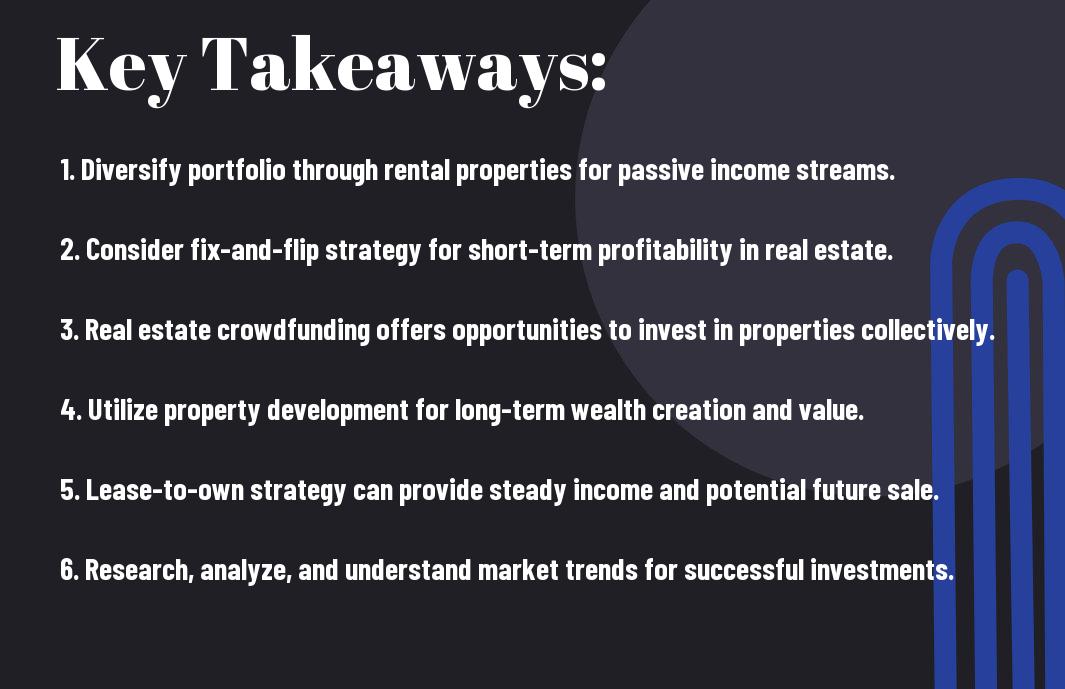Many investors turn to real estate as a proven method for wealth accumulation. With a multitude of investment strategies available, from traditional rental properties to innovative real estate crowdfunding platforms, there are endless opportunities to generate passive income and grow your wealth. In this blog post, we will explore various real estate investment strategies that can help you unlock the potential for financial success through property investments.

The Basics of Real Estate Investing
Types of Real Estate Investments
A fundamental aspect of real estate investing is understanding the different types of properties you can invest in. From traditional rental properties to innovative real estate crowdfunding platforms, there are various avenues for accumulating wealth through real estate. Recognizing the nuances of each investment strategy will help you make informed decisions on where to allocate your resources.
| Rental Properties | Stable source of income through property rent |
| Real Estate Crowdfunding | Pooling funds with other investors for larger projects |
| Real Estate Investment Trusts (REITs) | Investing in publicly listed companies that own and manage real estate |
| Fix and Flip | Buying distressed properties, renovating them, and selling for a profit |
| Commercial Real Estate | Investing in income-producing properties like offices, retail centers, and industrial spaces |
Evaluating Market Conditions for Investment
Evaluating market conditions is crucial for successful real estate investing. By analyzing factors like supply and demand, interest rates, and economic indicators, investors can make informed decisions on when and where to invest. Understanding the market dynamics will help mitigate risks and maximize returns.
Another important aspect to consider is the local market trends and growth potential of the area you are investing in. Factors such as population growth, job opportunities, and infrastructure development can impact the value and demand for real estate properties. Conducting thorough market research and working with experienced real estate professionals can provide valuable insights for making strategic investment decisions.

Buy and Hold Investing
Advantages of Long-term Property Holdings
Even in a volatile market, buy and hold investing remains a favored strategy among seasoned real estate investors. The key advantage of this strategy lies in the ability to generate passive income through rental properties, while also benefiting from property appreciation over time. By holding onto an investment property for the long term, investors can capitalize on the potential for long-term wealth accumulation and portfolio diversification.
Finding the Right Properties for Buy and Hold
The search for the perfect property to add to your buy and hold portfolio can be a challenging yet rewarding process. The key to success lies in conducting thorough research and due diligence to identify properties with strong rental potential and long-term growth prospects. Factors such as location, market trends, property condition, and rental demand must all be carefully considered before making a purchase.
The process of finding suitable properties for buy and hold investing requires a keen eye for detail and an understanding of market fundamentals. Investors should focus on properties in desirable neighborhoods with amenities, good school districts, and easy access to transportation. Analyzing rental market trends and property appreciation rates in specific areas can also help in making informed investment decisions.
Fix and Flip Strategies
Identifying Profitable Fixer-Upper Properties
All successful fix and flip strategies begin with identifying profitable fixer-upper properties. Look for properties that are undervalued due to their condition, location, or outdated features. Conduct thorough market research to assess the potential resale value of the property post-renovation. Consider factors such as the neighborhood’s appreciation rate, the demand for renovated homes in the area, and any upcoming development projects that could positively impact property values.
Budgeting and Managing Renovations
Fixer-upper projects can quickly spiral out of control without proper budgeting and project management. Set a realistic budget that includes the purchase price, renovation costs, holding costs, and a buffer for unexpected expenses. Create a detailed renovation plan outlining the scope of work, timeline, and desired upgrades. Consider hiring experienced contractors and project managers to oversee the renovation process and ensure quality workmanship within budget and schedule constraints.
Understanding the renovation process is key to maximizing the profitability of fix and flip properties. Prioritize renovations that offer the highest return on investment, such as kitchen and bathroom upgrades, flooring replacements, and cosmetic updates that enhance the property’s curb appeal. Keep a close eye on renovation costs and timelines to avoid delays and overspending, ultimately improving your chances of a successful fix and flip project.
Rental Properties as Income Generators
Single-Family vs. Multi-Family Rentals
Generators of passive income, rental properties stand as a popular choice for real estate investors seeking to build wealth over time. When considering rental properties, investors are often presented with the choice between single-family homes and multi-family units. Single-family homes can offer simplicity in management and potentially higher appreciation rates, while multi-family properties can provide greater cash flow through multiple rental units under one roof.
Property Management and Tenant Relations
Properties require ongoing maintenance and tenant management to ensure consistent cash flow and property value appreciation. Property management can be outsourced to professional management companies or self-managed by investors. Building positive tenant relationships through clear communication, timely maintenance, and fair rental policies is crucial for long-term success in property investment. Investors can also consider using technology tools to streamline property management processes and enhance tenant experiences.
With careful planning and investment strategy, rental properties can serve as a stable income stream and a valuable asset for wealth accumulation in the real estate market. Investors should conduct thorough market research, establish effective property management systems, and maintain open communication with tenants to maximize returns and mitigate risks associated with rental property ownership.
Real Estate Crowdfunding and REITs
Many savvy investors are turning to real estate crowdfunding and Real Estate Investment Trusts (REITs) as alternative ways to invest in the lucrative real estate market. Crowdfunding platforms allow individual investors to pool their money together to invest in commercial or residential properties, without the hassle of direct property ownership. On the other hand, REITs are publicly traded companies that own, operate, or finance income-producing real estate across a range of sectors.
Crowdfunding Platforms: Pros and Cons
| Pros | Cons |
| Diversification | Less control over investment decisions |
| Lower investment minimums | High fees |
| Access to deals in different markets | Risk of project failure |
Understanding Real Estate Investment Trusts (REITs)
Crowdfunding offers investors the ability to participate in real estate projects with lower investment minimums and greater diversification, but it comes with its own set of risks such as less control over investment decisions and the potential for project failure due to external factors beyond the investor’s control.
Real Estate Investment Trusts (REITs) are another popular option for wealth accumulation through real estate. REITs provide individuals with the opportunity to invest in large-scale, income-producing real estate assets without the need for direct property ownership. These trusts typically pay high dividends and offer liquidity as they are traded on major stock exchanges.
Trusts can provide a steady stream of passive income and strong total returns over time. They are subject to market fluctuations, interest rate changes, and other economic factors, so it’s crucial for investors to conduct their due diligence before investing in REITs. Overall, both real estate crowdfunding and REITs offer unique ways for investors to access the real estate market and potentially achieve wealth accumulation.
Utilizing Leverage in Real Estate
The Role of Mortgage Financing
To maximize your real estate investment potential, leveraging mortgage financing can be a powerful tool. By obtaining a mortgage, you can acquire properties with a fraction of the total cost, allowing you to diversify your real estate portfolio and increase potential returns. Additionally, with historically low interest rates, mortgage financing can provide you with the ability to access more properties and grow your wealth exponentially over time.
Risks and Rewards of Leveraged Investments
An vital aspect of utilizing leverage in real estate investment is understanding the risks and rewards involved. While leveraging can amplify your profits, it also exposes you to financial risks, especially in volatile markets. It is crucial to conduct thorough research and analysis before committing to leveraged investments to mitigate potential losses and ensure a successful real estate investment journey. Diversification, proper risk management strategies, and a long-term investment approach can help balance the risks and rewards of leveraged investments for wealth accumulation.

Advanced Investment Techniques
Unlike traditional real estate investment strategies such as rental properties and real estate crowdfunding, advanced investment techniques offer unique opportunities for wealth accumulation. Here are some advanced strategies to consider:
- Commercial Real Estate Investment
Property Type Investment Potential Office Buildings Diverse rental income streams Retail Centers Potential for high foot traffic and profitability Industrial Properties Stable long-term tenants
Commercial Real Estate Investment
Estate investors looking to diversify their portfolios and potentially earn higher returns may consider delving into commercial real estate. Commercial properties such as office buildings, retail centers, and industrial properties offer unique investment potential, including diverse rental income streams, high foot traffic, and stable long-term tenants. However, investing in commercial real estate requires a thorough understanding of market dynamics, tenant needs, and property management strategies.
Tax Strategies for Real Estate Investors
Investment in real estate comes with its own set of tax advantages and challenges. Savvy investors can leverage various tax strategies to minimize tax liabilities, maximize deductions, and optimize their overall investment returns. From utilizing 1031 exchanges for deferring capital gains taxes to taking advantage of deductions for depreciation and property expenses, tax strategies play a crucial role in real estate investment success.
This chapter explores into advanced investment techniques that go beyond traditional real estate strategies, offering insight into commercial real estate investment opportunities and tax strategies for optimizing investment returns. By exploring these advanced techniques, investors can unlock new avenues for wealth accumulation and portfolio growth.
Diversifying Your Real Estate Portfolio
Geographic Diversification
Not all real estate markets perform the same way at any given time. By diversifying your real estate portfolio geographically, you can mitigate risk and take advantage of opportunities in different regions. For example, while the rental market may be booming in one city, property values may be stagnant or declining in another. Researching and investing in diverse locations can help optimize your overall returns and minimize risk.
Asset Class Diversification
Portfolio diversification goes beyond just geographic locations. Asset class diversification within real estate can also help balance risks and rewards. By investing in a mix of residential, commercial, and industrial properties, you can spread your investments across different sectors of the real estate market. This strategy can help protect your portfolio from sector-specific downturns and capitalize on the strengths of each asset class.
Asset class diversification can provide stability and income potential, with residential properties offering steady rental income, while commercial properties may provide higher returns through lease agreements and capital appreciation. By carefully selecting a mix of property types, you can create a well-rounded real estate portfolio that generates sustainable wealth accumulation.
Navigating Legal and Tax Implications
Property Law Basics for Investors
For aspiring real estate investors, understanding the rudiments of property law is imperative in safeguarding their interests. From rental agreements to zoning laws, a thorough grasp of legal aspects can mitigate risks and enhance returns on investment. Consultation with legal experts can offer invaluable insights into property ownership rights, obligations, and potential pitfalls in the ever-evolving real estate market.
Tax Benefits and Liabilities Across Investment Strategies
On the financial front, taxes play a significant role in shaping real estate investment decisions. Different strategies, such as rental properties or real estate crowdfunding, come with distinct tax implications that impact overall profitability. Investors must be aware of potential tax benefits, like deductions on mortgage interest or depreciation, as well as liabilities such as capital gains taxes upon property sale. Seeking guidance from tax professionals can help optimize investment structures and minimize tax burdens.
Navigating the complex landscape of legal and tax considerations in real estate investment requires diligence and expertise. By staying abreast of property law imperatives and tax obligations, investors can venture into the market with confidence and strategic foresight, ensuring a solid foundation for wealth accumulation through property.
Technology and Real Estate Investing
Proptech Innovations and Their Impact
Impact: Keep up with the latest trends and technologies in real estate investing to stay ahead in the game. The book Unlocking Wealth: Masterful Real Estate Investment Strategies provides valuable insights into how proptech innovations are reshaping the real estate industry, offering new opportunities for investors to maximize their wealth accumulation.
Online Tools and Resources for Investors
Estate: With the advancement of technology, online tools and platforms have revolutionized the way investors research properties, analyze market trends, and connect with potential opportunities. These resources offer a wealth of data and insights that can empower investors to make informed decisions and optimize their real estate portfolios for higher returns.
Building an Investment Network and Team
After reading the insightful article titled How to Make Money in Real Estate: Unlocking the Secrets …, you likely understand the power of networking and building a strong team in the real estate investment industry.
The Importance of Networking in Real Estate
Networking plays a crucial role in real estate investment, as it allows you to connect with potential partners, investors, and industry experts who can provide valuable insights and opportunities. By actively participating in real estate conferences, meetups, and online forums, you can expand your knowledge base, gain access to new investment opportunities, and build lasting relationships within the industry.
Assembling Your Real Estate Dream Team
With real estate investment, success often hinges on the strength of your team. It’s important to surround yourself with professionals such as real estate agents, property managers, contractors, and financial advisors who can provide expertise and support throughout your investment journey. Each member of your team brings a unique set of skills and knowledge that can help you make informed decisions, mitigate risks, and maximize returns on your investments. It is crucial to vet potential team members carefully, ensuring they align with your investment goals and values. Keep in mind, success in real estate investment is a team effort.
Monitoring, Managing, and Growing Your Investments
Setting up Systems for Property Monitoring
Despite the initial thrill of acquiring properties, it is crucial to establish robust systems for monitoring their performance to ensure long-term success. Setting up systems for property monitoring involves tracking key metrics such as rental income, expenses, and occupancy rates. Utilizing property management software can streamline this process and provide valuable insights into the financial health of your investments.
Strategies for Portfolio Expansion
Managing a real estate investment portfolio involves more than just acquiring properties. It also includes strategic planning for expansion and growth. By diversifying your portfolio with different types of properties in various locations, you can spread risk and capitalize on market opportunities. Additionally, regularly reviewing and optimizing your portfolio through acquisitions, disposals, or renovations can help maximize returns and ensure a healthy investment portfolio.
With careful monitoring and savvy management, investors can unlock the full wealth-building potential of their real estate investments. By implementing robust monitoring systems and strategic portfolio expansion strategies, investors can build a resilient and profitable real estate portfolio that paves the way for long-term wealth accumulation.

Summing up
So, whether you’re interested in acquiring rental properties for long-term income or exploring the world of real estate crowdfunding for diversification and passive income, there are a variety of real estate investment strategies to consider for wealth accumulation. Each strategy offers its own benefits and potential risks, so it’s important to thoroughly research and consider your financial goals and risk tolerance before exploring into the world of real estate investing. By strategically investing in real estate, you can unlock opportunities for wealth accumulation and potentially build a solid financial foundation for the future.
FAQ
Q: What are some key real estate investment strategies for wealth accumulation?
A: Some key real estate investment strategies for wealth accumulation include rental properties, fix-and-flip projects, real estate crowdfunding, and short-term vacation rentals. Each strategy has its own set of risks and rewards, so it’s important to carefully consider your investment goals and risk tolerance before pursuing any particular strategy.
Q: How can rental properties be a strong investment choice for wealth accumulation?
A: Rental properties can be a strong investment choice for wealth accumulation due to their potential for passive income generation and long-term appreciation. By renting out the property to tenants, investors can enjoy a steady stream of rental income while also benefiting from property value appreciation over time. Additionally, rental properties can provide tax advantages and diversification in an investment portfolio.
Q: What is real estate crowdfunding and how can it help investors accumulate wealth?
A: Real estate crowdfunding is a method of pooling funds from multiple investors to invest in real estate projects. This strategy allows investors to access potentially lucrative real estate opportunities with lower capital requirements and less hands-on involvement compared to traditional real estate investments. By investing through crowdfunding platforms, investors can diversify their real estate portfolio, benefit from passive income, and potentially achieve higher returns on their investments.




